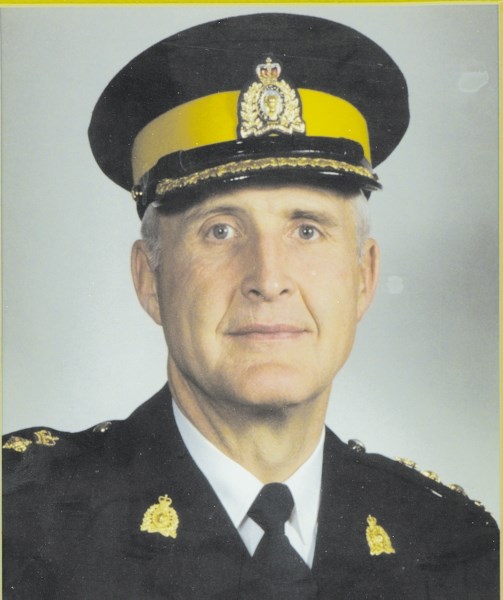Bob Head was an extremely successful RCMP officer, serving 38 years with the force until his retirement in 1991.
When asked how he managed to move up through the ranks to the impressive position of assistant commissioner, he humbly replied “if you stay around long enough, you get lucky”.
Bob is a role model of living a rewarding life in a career that he loved and is willing to freely share the hardships endured and the leadership qualities he possessed to enable him to make a difference.
Bob was born in 1935, raised on a farm near Birch Hills, Sask. (east of Prince Albert). He left home to play hockey, but soon found out that it was not his game.
He joined the RCMP in 1953 at the age of 18, and after training in Regina and Ottawa, he started as a constable in various towns in B.C.
He married Beverly, a registered nurse, in 1958 and they have five children: Timothy, Barry, Laurene and Robyn. (Lorelee, their oldest daughter died at the age of eight from leukemia.) Their children are scattered, however Bob and Beverly are happy that Laurene and her family recently moved to Cochrane from Montreal. They are blessed with 11 grandchildren.
Raising a large family in an RCMP career meant many transfers and moves.
Bob said, “We are in our 25th home now, after 54 years of marriage and I doubt very much that we would ever leave Cochrane. We chose this place in 1997 because we felt it was a ‘Hallmark town’, where people cared about each other and accepted us readily.”
In 1972 Bob was promoted to staff sergeant and transferred to Ottawa.
“At that time a staff relations branch was needed, they chose me to be the spokesperson from rank and file. I was the first internal communication officer in the force” said Bob. “When the staff relations branch was established, I was put in charge.”
“When the Queen and Prince Philip visited Saskatchewan in 1978, I was in charge of security for the province, so I had the distinct honour of accompanying the Queen on her five cities Royal Tour around the province. She presented me with a signed photograph of herself with Prince Philip and a set of ER cufflinks, as a thank you.”
After the Queen’s visit, Bob spent five years as commanding officer of the North Battleford sub-Division.
His next post in 1985 was commander of the Northwest Territories (before it split into east and west).
“I did not have a large staff, just a large territory. However, we had three Twin Otter aircraft available to us to manage the distances between Yellowknife, Inuvik and Frobisher Bay” explained Bob.
A complete review of aboriginal policing services was required close to Bob’s retirement date; and he agreed to do it.
This review took approximately one year with the result being a paper written by Bob entitled “Policing for Aboriginal Canadians – The RCMP Role”.
Eighty-two recommendations were given in the report to the federal government and all were adopted.
Wouldn’t you know it – Bob was asked to stay on to be the director of Aboriginal policing. retirement was again delayed.
But Bob’s working career did not stop at retirement. He was a man of conviction and wanted to make things right. “After I retired in 1991, I was convinced that I should go into politics because I wanted to improve the justice system; a plan which did not work out.”
He joined the Reform Party, becoming the first Reform candidate in the Saskatchewan Humboldt constituency.
There were six candidates, but Bob came in second, with the Liberal candidate winning. He chose not to run in the next election.
In 1999, Bob was asked to make a presentation to the American Society of Criminologists, which was meeting in Toronto. Bob stuck his neck out here — to make a point.
His dissertation was called “The Politicization of the RCMP”. Bob admitted “this created adverse reaction from management; however, support from the staff.
It was picked up by the media and distributed around”.
The hardships of the job would definitely be to endure the loss of fellow officers, sometimes very good friends, numerous murder investigations and some unsolved cases, which continue to haunt the inquisitive mind.
Finding a compatible liaison between management and staff remains an unending challenge with any large corporation.
Moving a family constantly across the country also gives much credit to an understanding and loving wife.
Sixteen years ago Bob’s wife, Beverly was diagnosed with Parkinson’s disease.
Bob being the type of man he is, jumped right in to volunteer and served on the Board for the Southern Alberta Parkinson’s Society.
Over time, he is needed at home more, so he remains active in the local group in Cochrane only.
In his further attempt to improve research and comfort for Parkinson patients, he has served on the Cochrane board for the warm water therapy pool society.
This committee is entering the fundraising stage at present.
Other committees he has served on are: Protective Services Advisory Committee; Canadian Executive Service Organization (CESO) and the Federal Firearms Advisory Committee.
For his dose of recreation, Bob is involved with seniors curling in both the men’s and mixed leagues in Cochrane.
On Dec. 5 at 7 p.m., Bob will be speaking at Seniors on the Bow about a 1941 Northwest Territories murder investigation covering the Eastern Arctic of Belcher Island murders.
The subject is “Early Life in the Canadian Arctic”; the first of a series to be presented by Seniors on the Bow entitled “The Voice of Pioneers”.
Bob was honoured with the Diamond Jubilee Award presented by the Prime Minister and Governor General in October, together with 15 other recipients from the Cochrane area.
Well deserved, to say the least.




